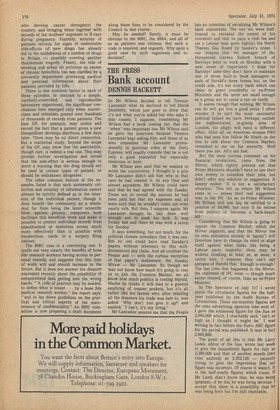THE PRESS
Bank account
DENNIS HACKETT
So Mr Wilson decided to tell Terence Lancaster what he declined to tell David Dimbleby, which just goes to show that it's not what you're asked but who asks it that counts. I suppose, considering Mr Wilson had a book coming out, that the '
when' was important too. Mr Wilson said he gave the interview because Terence Lancaster kept asking him, and those of us who remember Mr Lancaster professionally in previous roles at the Daily Express, will readily concede that he is not only a good journalist but especially tenacious to boot.
Mr Wilson also said that he wanted to settle the controversy. I thought it a pity Mr Lancaster didn't ask him why in that case he had created it. At any time and almost anywhere, Mr Wilson could have said that he had agreed with the Sunday Times not to reveal the amount he had been paid but that his expenses and all were such that he wouldn't come out even nearly rich. But then, I suppose again, Mr Lancaster thought he had done well enough not to push his luck. It was Friday last and there he was with a scoop for Sunday.
It says something, but not much, for the political climate nowadays that it was one. But no one could have read Sunday's papers without reference to this welldocumented pay claim. And all credited the People and — with the curious exception of that paper's stablemate, the Sunday Mirror — Mr Lancaster. So though we may not know how much it's going to cost us to join the Common Market, we all know how much politics is costing Harold. Maybe he thinks it will lead to a general emptying of trouser pockets, but it's all rather like the farmer who, after retailing all the disasters his trade was heir to, was asked Why don't you give it up?' and replied; I can't, it's my living.'
Mr Lancaster assures me that the People
has no intention of serialising Mr Wilson's bank statements, The one we were halftreated to revealed the extent of his overdraft and that he pays a club fee and (as a Labour man quite rightly) the North Thames Gas Board by banker's order. I can imagine that the manager of the Hampstead Garden Suburb branch of Barclays went to work on Monday with a new sense of importance. I hope for Barclays' sake they don't have to maintain one of those built-in bank managers in each of Harold's three homes but, on the credit side, it's not every bank which can claim to grant overdrafts to ex-Prime Ministers and the latter are small enough as a group not to cause a run on funds.
It seems though that nothing Mr Wilson can do will get him a good press, I often wonder if he isn't the most successful political failure we have. Perhaps, outside the sophisticated, in-gossip area of London, his plight will have a different effect. After all, an American woman PRO who had seen him follow Mr Heath on the box to talk about the Common Market, remarked to me on his sincerity. Well there you are. All's not lost.
But the most curious comment on his financial revelations, came from the Mirror, which rightly pointed out that Prime Ministers shouldn't have to use their own money to subsidise their jobs, but didn't offer any solution or suggestion. It lamely ended: 'It is not a satisfactory situation,' This left us where Mr Wilson came in — unless their real suggestion was in the PS: 'As an ex-Prime Minister, Mr Wilson will one day be entitled to a pension of £4,000, but only if he retires from politics or becomes a back-bench MP.'
Considering that Mr Wilson is going to oppose the Common Market, which the Mirror supports, and that the Mirror (on its own admission already in 'agony') will therefore have to change its mind or align itself against what looks like being a Labour party majority, thois may be wishful thinking at least or, at most, a veiled hint. I suppose they can't say apropos of Harold that Enough is enough.' The last time that happened in the Mirror, the chairman of IPC went — though much better treated, of course, than an ex-Prime Minister.
In The Spectator of July 117 I wrote about the circulation figures for the halfyear published by the Audit Bureau of Circulations. These six-monthly figures are the ones advertising agencies take note of. I gave the estimated figure for the Sun as 2,080,000 which, I charitably said, 'isn't as high as I thought it might be.' I was writing in fact before the Sun's ABC figure for the period was published. It was in fact 2,080,686.
The point of all this is that Mr Larry Lamb, editor of the Sun, wrote last week to give the (unaudited) figure for July as 2,380,000 and that of another month (thiS time audited) as 2,352,126 — patently trying to give the impression that my figure was incorrect. Of course it wasn't. It is the half-yearly figures which count. If Mr Lamb didn't know that, he was being ignorant: if he did, he was being devious. I accept that there is a possibility that he was being both but I'm still charitable.










































 Previous page
Previous page